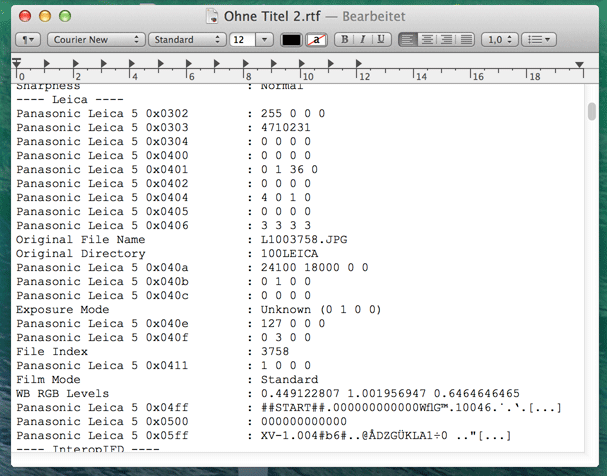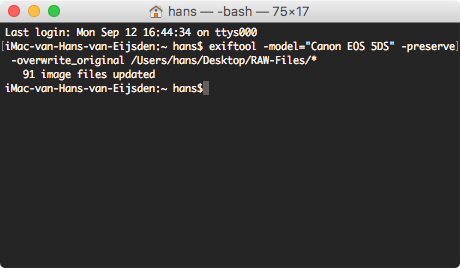

ExifTool supports many different metadata formats including EXIF, GPS, IPTC, XMP, JFIF, GeoTIFF, ICC Profile, Photoshop IRB, FlashPix, AFCP and ID3, as well as the maker notes of many digital cameras by Canon, Casio, FLIR, FujiFilm, GE, HP, JVC/Victor, Kodak, Leaf, Minolta/Konica-Minolta, Nikon, Nintendo, Olympus/Epson, Panasonic/Leica, Pentax/Asahi, Phase One, Reconyx, Ricoh, Samsung, Sanyo, Sigma/Foveon and Sony. From this I can discern there are both 16 and 8 bitdepths in this set of TIFFs.ExifTool is a platform-independent command-line application for reading, writing, and editing Meta information contained in a variety of visual, audio, and video files. For example, I turned on Filter view and looked at the Bits Per Sample column. If you have a very large report, use the “Filter” in Microsoft Excel to review all of the entries in a given column quickly.The following technical specifications are available (note that the report does not actually return the field names in the first row.Your report should now be saved into the directory you chose.This is what it looks like when the report is complete:.This is what it looks like when the program is still running:.txt file in the folder you directed it to save to. Depending on the number of scans, Exiftool will work for a few seconds to an hour, then create a.Type, then drag and drop the subdirectory of TIFFs or JPEGs behind the space.If you would like to give the report a specific name, replace the text “NAMEOFREPORT.txt” with whatever name you would like, followed by the extension “.txt” (Example: BOX2REPORT.txt). Delete the “ /file path/” portion of the code(s) above.JPEGs: exiftool -T -r -ext jpg -FileName – Model -ImageSize -Megapixels -XResolution -BitsPerSample -FileSize -FileType -ProfileDescription -Directory -w+ %0fNAMEOFREPORT.txt /file path/.

TIFFs: exiftool -T -r -ext tif -FileName – Model -ImageSize -Megapixels -XResolution -BitsPerSample -FileSize -FileType -ProfileDescription -Directory -w+ %0fNAMEOFREPORT.txt /file path/.Determine whether you want to check tiffs or jpgs.Drag and drop the folder where you want your report to be saved into Terminal behind the space.


The following are instructions to run the command line tool Exiftool in Terminal (I think it can be adapted for Windows fairly easily, but I have not done so here). By Brigham Young University and Phil Harvey


 0 kommentar(er)
0 kommentar(er)
